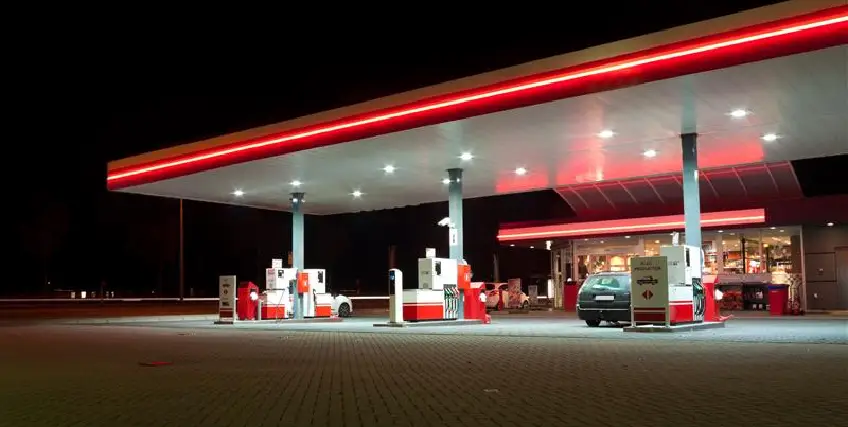Top Financing Strategies for Adding Convenience Services to Your Gas Station
January 28, 2025 | Last Updated on: January 29, 2025

Gas stations have long been hubs for fuel, but with changing consumer demands and increasing competition, many owners are exploring ways to diversify their revenue streams. One of the most effective ways to do this is by adding convenience services such as food, beverages, car washes, and retail products to your gas station. While these services can provide significant returns, expanding your offerings requires substantial capital investment. Fortunately, various financing strategies are available to help you fund these upgrades. Below, we’ll explore the top financing options for starting a gas station convenience store
1. SBA Loan for Gas Stations
The Small Business Administration (SBA) offers several loan programs designed to assist small business owners, including gas station owners, with expanding their operations. SBA loans are particularly attractive due to their low-interest rates, extended repayment terms, and relatively flexible qualification requirements. These loans can be used for a range of purposes, including renovations, equipment purchases, and working capital for launching new services at your gas station.
Key Features:
- Loan Types: The SBA offers various loan types, such as the 7(a) loan program, which is the most common and can be used for general business purposes like adding convenience services.
- Interest Rates: SBA loans generally have lower interest rates compared to traditional bank loans, often ranging from 5% to 10%.
- Loan Terms: These loans are typically longer in duration (up to 25 years), which can reduce monthly payments and help with cash flow management.
Pros:
- Low Interest Rates: SBA loans usually offer lower rates than traditional loans, making them more affordable in the long run.
- Longer Repayment Periods: With extended repayment terms, SBA loans allow you to spread out payments over a longer period, reducing the immediate financial burden.
- Access to Larger Loan Amounts: The SBA loan for gas stations, in particular, can provide large sums of money, which is helpful when significant upgrades such as adding a gas station convenience store.
Cons:
- Lengthy Application Process: SBA loans can take several months to be approved, as the application process involves substantial documentation and paperwork.
- Longer Repayment Periods: While SBA loans are relatively accessible, they still require a solid credit history, stable business performance, and an in-depth business plan.
SBA loans are an excellent option if you’re looking to make significant investments in adding convenience services and can wait for the approval process. However, if you need immediate funding, other options may be more suitable for gas station financing requirements.
2. Equipment Financing
When adding to a gas station convenience store, you will likely need to purchase new equipment, such as refrigerators, display coolers, point-of-sale (POS) systems, coffee machines, or even a car wash system. Equipment financing is a specialized loan designed purchase such assets and can be a specific business loan for gas stations. The equipment itself acts as collateral, which reduces the risk for lenders and can result in more favorable gas station financing requirements
Key Features:
- Collateral: The equipment purchased with the loan serves as collateral, meaning the lender can repossess it if you fail to repay the loan.
- Repayment Terms: Equipment financing typically involves shorter repayment terms (ranging from one to 7 years), with fixed monthly payments.
Pros:
- No Need for Additional Collateral: Since the equipment itself serves as collateral, you don’t need to use personal or other business assets.
- Preserved Working Capital: By financing your equipment purchases, you can preserve cash for other business needs or emergencies.
- Flexibility: Some lenders allow you to include installation, training, and other related costs in the financing package.
Cons:
- Higher Interest Rates: While equipment financing tends to be easier to secure than other types of loans, interest rates can be higher than SBA loans.
- Strict Lending Criteria: Depending on the lender, equipment financing may still require a decent credit score and a strong business performance history.
Equipment financing is ideal for purchasing specific, high-cost items necessary for adding convenience services. If your capital is tied up elsewhere and you need new equipment, this could be an excellent business loan for a gas station option.
3. Business Lines of Credit
A business line of credit offers flexibility when managing cash flow. It allows you to borrow up to a certain limit, and only pay interest on the amount you draw. This makes a business line of credit perfect for covering the fluctuating costs adding a gas station convenience store.
Key Features:
- Revolving Credit: Once you repay the amount you borrowed, your credit line is replenished, and you can borrow again as needed.
- Interest Payments: You are only required to pay interest on the funds you use, which can save money if you only need a small amount at any given time.
Pros:
- Flexibility: Business loans for gas stations have credit and are highly flexible, allowing you to borrow only what you need, when you need it.
- Quick Access to Funds: Once you have the line of credit set up, funds are readily available for immediate use.
- Lower Interest Rates: Compared to other short-term loans, lines of credit tend to have lower interest rates.
Cons:
- Potential for Debt Accumulation: Without proper financial discipline, it’s easy to accumulate debt when using a line of credit, as the borrowing limit is replenished each time it’s repaid.
- Variable Interest Rates: While initial rates may be low, some lines of credit have variable interest rates, meaning costs could rise over time.
- Credit Score Requirements: While lines of credit are more accessible than traditional loans, lenders still require a decent credit score and business history.
If your gas station frequently experiences cash flow fluctuations or you need a flexible, ongoing source of funding for your convenience services, a business line of credit might be an ideal choice.
4. Traditional Bank Loans
For gas station owners with solid credit and a long track record of profitability, a traditional bank loan might be a straightforward and reliable option for financing the addition of convenience services. These loans can be used for a wide range of business purposes, including buying inventory, upgrading facilities, or expanding your offerings.
Key Features:
- Loan Amounts: Banks typically offer larger loan amounts, depending on the size and financial health of your gas station.
- Fixed Interest Rates: Many bank loans come with fixed interest rates, providing predictability in terms of monthly payments.
Pros:
- Large Loan Amounts: If your convenience services require a significant investment, a traditional bank loan can provide the capital you need.
- Predictable Payments: With fixed interest rates, you can easily budget for your monthly loan payments.
Cons:
- Longer Approval Process: Traditional bank loans can take several weeks or even months to be approved, especially if the loan application is complex.
- Strict Qualification Criteria: Banks require good credit and a solid business track record to qualify, making this option less accessible for newer or struggling gas stations.
Traditional bank loans are an excellent option if you have a well-established business and a clear vision for your gas station's future. However, they may not be ideal for urgent or smaller financing needs in establishing a gas station convenience store.
5. Merchant Cash Advances (MCA)
A Merchant Cash Advance (MCA) is a financing option where you receive a lump sum of cash in exchange for a portion of your future credit card sales or daily revenue. This option is particularly useful for gas station owners who need quick access to cash to fund convenience services, such as stocking shelves, setting up food service counters, or marketing new offerings.
Key Features:
- Repayment Based on Sales: Repayments are automatically deducted from your daily sales, which can provide some relief during slow periods.
- Quick Access to Funds: The approval process is typically much faster than traditional loans, with funds being available within a few days.
Pros:
- Fast Funding: One of the main advantages of an MCA is the quick approval and disbursement of funds.
- Flexible Repayment: Because repayments are tied to your daily sales, there is less pressure during slow periods.
- Easier Qualification: MCAs are often easier to qualify for compared to other loans, especially if your gas station has consistent sales.
Cons:
- High Fees and Interest Rates: The cost of an MCA can be significantly higher than traditional loans, with effective interest rates often exceeding 50% or more.
- Impact on Cash Flow: Because repayments are deducted from daily sales, an MCA can affect your cash flow, especially during lower revenue periods.
MCAs are useful if you need fast access to capital and steady sales but are willing to pay a premium for flexibility. This option can be a good fit for short-term funding to kickstart gas station convenience store services.
6. Crowdfunding or Equity Financing
If you’re open to giving up some control in your business, crowdfunding or equity financing can help raise the capital needed to add convenience services. Crowdfunding platforms, such as Kickstarter or GoFundMe, allow you to solicit small investments from a large pool of people, while equity financing involves selling a stake in your gas station to investors in exchange for capital. This funding can also be used to help market “gas station convenience store near me” with social posts and hashtags.
Key Features:
- Crowdfunding: Collect small amounts from many people, often in exchange for rewards or incentives (such as free gas or merchandise).
- Equity Financing: Investors provide capital in exchange for an ownership share in the business.
Pros:
- No Repayment Requirement: Crowdfunding allows you to raise funds without taking on debt or needing to repay investors.
- Potential for Long-Term Investment: Equity financing can provide not just capital, but also valuable expertise and connections from investors.
Cons:
- Loss of Control: In equity financing, you may need to give up some degree of control over decision-making.
- Time and Effort: Both crowdfunding and equity financing require significant effort in marketing and pitching to investors, and success is not guaranteed.
This financing option is suitable for gas station owners looking for community engagement or who are willing to share ownership in exchange for capital and expertise.
Final Thoughts on Gas Station Convenience Stores
Adding convenience services to your gas station can help diversify your revenue streams and attract more customers. However, securing financing for these upgrades requires a solid understanding of your financing options. Whether you choose an SBA loan, equipment financing, a business line of credit, or another strategy, each method has its own pros and cons depending on your specific needs, business stage, and urgency.
By carefully evaluating your options and selecting the right financing strategy, you can secure the capital necessary to expand your gas station and offer new services that will drive revenue and keep your business competitive in the evolving marketplace.
FAQs about Gas Station Convenience Store Financing
What are the downsides of an SBA loan for a gas station?
SBA loans can take several months to be approved because the application process involves substantial documentation and paperwork. SBA loans also require a good credit history to be considered.
Is crowdfunding considered equity financing?
Not necessarily. Crowdfunding offers incentives to those who donate money towards a cause, while equity financing gives investors stake into the company.
How long is an SBA loan term?
SBA loans can be up to 25 years. This is a good option for anyone looking to spend less up front – the length of the loan can reduce monthly payments and help with cash flow management.
What are the qualifications for a Merchant Cash Advance loan?
Most businesses who qualify for an MCA usually have:
- Credit Score: 525-550
- Annual Revenue: $150,000-$200,000
- Time in Business: 18-24 months (about 2 years) minimum
Do traditional bank loans offer more financing than other options?
Yes, traditional bank loans can offer larger loan amounts. However, this depends on the size and financial health of your gas station.




